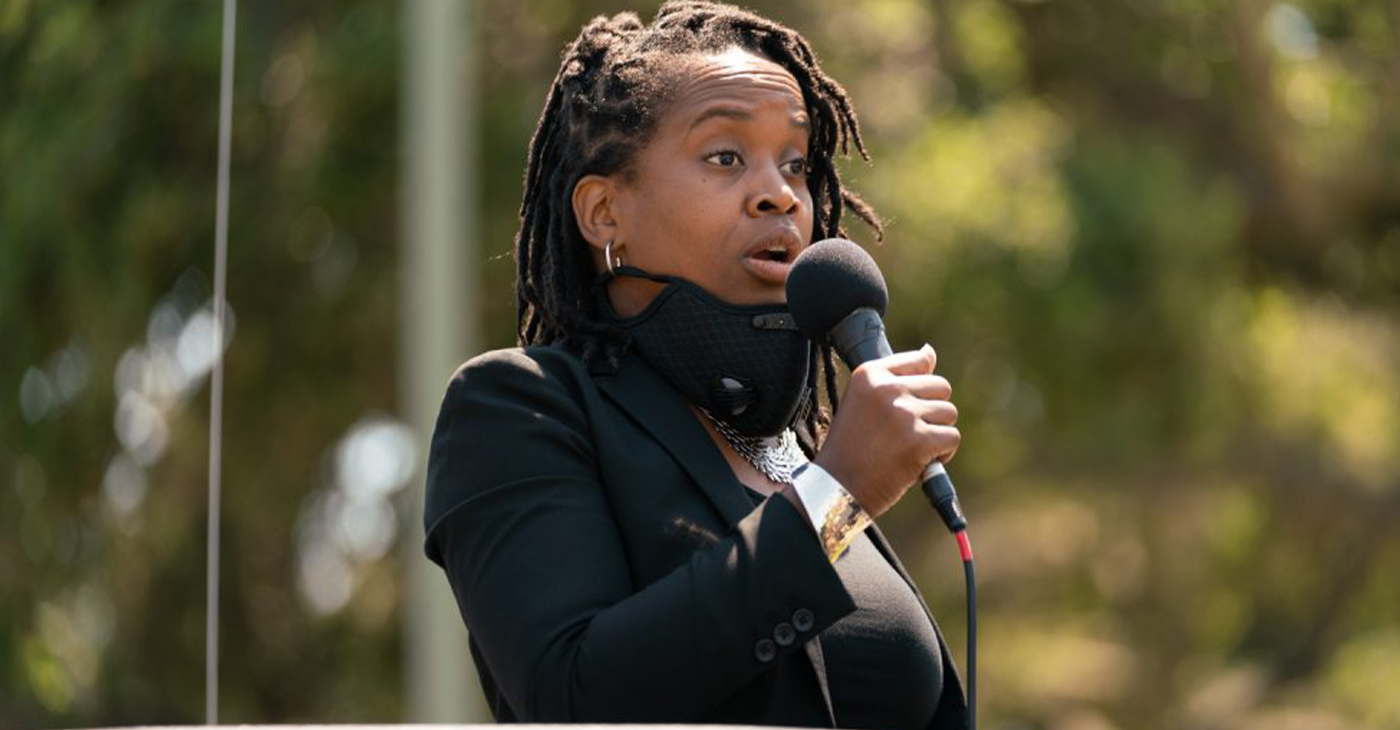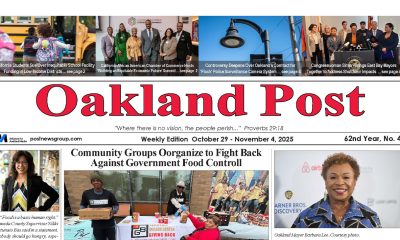Bay Area
Former Prisoners, Advocates Hold Solitary Confinement Symposium at CSU Fullerton
On July 7 and 8, the California Families Against Solitary Confinement (CFASC) held a symposium at California State University at Fullerton to celebrate the 10th anniversary of the historic agreement to end hostilities among inmates and to mark the three hunger strikes that occurred at the Pelican Bay State Prison from 2011-2012.

How the Mexican Mafia, Nuestra Familia, Black Guerrilla Family (BGF), and Aryan Brotherhood’s agreement to end hostilities against each other in prison could also be applied on the streets with gangs.
By Richard Johnson
On July 7 and 8, the California Families Against Solitary Confinement (CFASC) held a symposium at California State University at Fullerton to celebrate the 10th anniversary of the historic agreement to end hostilities among inmates and to mark the three hunger strikes that occurred at the Pelican Bay State Prison from 2011-2012.
This symposium provided the opportunity for the families, victims, supporters, and for all those who made the hunger strike and agreement to cease hostilities a success. Former inmates recounted experiences of solitary confinement. The lawyers, therapists, psychologists, and support personnel spoke about how the strike and the agreement to end hostilities helped to make a positive paradigm change for the inmates and their families.
As a panelist, I spoke of how I was victimized by being held in solitary confinement for nearly 20 years because I was labeled a “gang member,” and referred to as “the worst of the worst.”
But I emphatically pointed out that many of those who had suffered and endured, as I did, are now out in society, making a change for the betterment of society and their families. They are proving that, when given a chance, they can make positive contributions.
I was even impressed by the magnitude of success that so many of my formerly incarcerated colleagues have achieved. There are so many with advanced college degrees and PhDs while others are attending universities such as Columbia, UC Berkeley, UC Fullerton, University of Southern California, and many others. If given the chance, both women and men can ascend out of hopelessness and despair to become better versions of themselves.
Jules Lobel, a professor of law at the University of Pittsburgh, was the main speaker at the symposium. He was given the honor to give the keynote address because he was the lead attorney for the hunger strikers as well as the main litigator before the federal courts. Lobel has written several books and numerous legal articles for Harvard, Cornell, Oxford and many other institutions of higher learning. (https://ccrjustice.org/node/4464)
I am grateful to all participants and especially to Dolores Canalis who organized this event with her husband Jack Morris. I want to thank unsung heroes and sheroes that we owe a debt of gratitude for their support, volunteerism and prayers.
They include; Danny Murillo, Azadeh Zohrabi of the Berkeley underground scholars; Angelica Camacho, Ph.D.; professor at San Francisco State University and a member of the California Families Against Solitary Confinement and coordinator for the Mandela Campaign; Jamala Taylor of the Inside Garden Program; Penny Schoner of Prison Activist Resource Center; panelist Marie Levin representing her brother Ronnie Dewberry (Sitawa Nantambu Jamaa) who was one of the four main people who negotiated the hunger strike as well as the litigations; my former attorney Dan Siegel and his wife Ann Weills; Post News Group and Jonathan ‘Fitness’ Jones an ambassador from the African American Sports and Entertainment Group (AASEG).
What must be mentioned is that at the onset of the hunger strike in 2011 the various formations weren’t exactly getting along, thus the first hurdle to overcome in petitioning the court for isolation relief was to open a dialogue between the formations, such as Mexican Mafia, Nuestra Familia, Black Guerrilla Family (BGF), and Aryan Brotherhood.
This took time and energy because of all the previously held positions of discord between them. As I sat there on that stage among old rivals, it gave me great pleasure to see the fruits of our labor manifested at that symposium. Who in the past could conceive such a step forward out of the rigors of prison politics?
I must mention one guy who was my next-door neighbor and a member of the Aryan Brotherhood at one time in Pelican Bay Security Housing Unit (SHU); his name was Eddie Burnett. We sat on that stage, side-by-side, participating in panel discussions, this in itself demonstrates the beauty of respect, cooperation, remarkable reconciliation, and of course persistence and understanding. Nothing is perfect yet everything is “solutionable.” The symposium clearly highlighted that fact. Where do we go from here now that a leap forward has been taken? Life can be made simple, either you win, or you don’t lose.
This symposium opens the door for us to bring an end to hostilities on the streets. If it can work in prison, it can work on the streets too.
We as a society have an obligation to at least try to make this world a better place. I feel the responsibility rests on our shoulders to do all that is necessary to make a change for the better.
Our non-profit organization, Formerly Incarcerated Giving Back (FIGB) is currently engaged in Transitional Reentry Housing Services with the Diplomat’s Center Inc. and providing mentorship, gang intervention, community safety, trauma-informed care, voter registration, and providing housing for the unhoused in collaboration with Dr. Maritony’s Life Impact for Humanity (LIFH).
FIGB, in partnership with Partners in Careers (PIC), will be advocating for and developing living-wage jobs and recreational spaces for development and technology training.
Special thanks to POST Newsgroup Publisher Paul Cobb and owner Gay Plair Cobb for being one of the first to give a substantial donation to the Formerly Incarcerated Giving Back (FIGB). And if you have been touched and/or moved to also contribute your time, resources, and/or donations to our great community efforts feel free to contact us at 1-888-711-8351 ext.1 or email us at formerlyinc.gb@gmail.com
Activism
Lu Lu’s House is Not Just Toying Around with the Community
Wilson and Lambert will be partnering with Mayor Barbara Lee on a toy giveaway on Dec. 20. Young people, like Dremont Wilkes, age 15, will help give away toys and encourage young people to stay in school and out of trouble. Wilkes wants to go to college and become a specialist in financial aid. Sports agent Aaron Goodwin has committed to giving all eight young people from Lu Lu’s House a fully paid free ride to college, provided they keep a 3.0 grade point average and continue the program. Lu Lu’s House is not toying around.

Special to the Post
Lu Lu’s House is a 501c3 organization based in Oakland, founded by Mr. Zirl Wilson and Mr. Tracy Lambert, both previously incarcerated. After their release from jail, they wanted to change things for the better in the community — and wow, have they done that!
The duo developed housing for previously incarcerated people, calling it “Lu Lu’s House,” after Wilson’s wonderful wife. At a time when many young people were robbing, looting, and involved in shootings, Wilson and Lambert took it upon themselves to risk their lives to engage young gang members and teach them about nonviolence, safety, cleanliness, business, education, and the importance of health and longevity.
Lambert sold hats and T-shirts at the Eastmont Mall and was visited by his friend Wilson. At the mall, they witnessed gangs of young people running into the stores, stealing whatever they could get their hands on and then rushing out. Wilson tried to stop them after numerous robberies and finally called the police, who Wilson said, “did not respond.” Having been incarcerated previously, they realized that if the young people were allowed to continue to rob the stores, they could receive multiple criminal counts, which would take their case from misdemeanors to felonies, resulting in incarceration.

Lu Lu’s House traveled to Los Angeles and obtained more than 500 toys
for a Dec. 20 giveaway in partnership with Oakland Mayor Barbara
Lee. Courtesy Oakland Private Industry,
Wilson took it upon himself to follow the young people home and when he arrived at their subsidized homes, he realized the importance of trying to save the young people from violence, drug addiction, lack of self-worth, and incarceration — as well as their families from losing subsidized housing. Lambert and Wilson explained to the young men and women, ages 13-17, that there were positive options which might allow them to make money legally and stay out of jail. Wilson and Lambert decided to teach them how to wash cars and they opened a car wash in East Oakland. Oakland’s Initiative, “Keep the town clean,” involved the young people from Lu Lu’s House participating in more than eight cleanup sessions throughout Oakland. To assist with their infrastructure, Lu Lu’s House has partnered with Oakland’s Private Industry Council.
For the Christmas season, Lu Lu’s House and reformed young people (who were previously robbed) will continue to give back.
Lu Lu’s House traveled to Los Angeles and obtained more than 500 toys.
Wilson and Lambert will be partnering with Mayor Barbara Lee on a toy giveaway on Dec. 20. Young people, like Dremont Wilkes, age 15, will help give away toys and encourage young people to stay in school and out of trouble. Wilkes wants to go to college and become a specialist in financial aid. Sports agent Aaron Goodwin has committed to giving all eight young people from Lu Lu’s House a fully paid free ride to college, provided they keep a 3.0 grade point average and continue the program. Lu Lu’s House is not toying around.
Activism
Desmond Gumbs — Visionary Founder, Mentor, and Builder of Opportunity
Gumbs’ coaching and leadership journey spans from Bishop O’Dowd High School, Oakland High School, Stellar Prep High School. Over the decades, hundreds of his students have gone on to college, earning academic and athletic scholarships and developing life skills that extend well beyond sports.

Special to the Post
For more than 25 years, Desmond Gumbs has been a cornerstone of Bay Area education and athletics — not simply as a coach, but as a mentor, founder, and architect of opportunity. While recent media narratives have focused narrowly on challenges, they fail to capture the far more important truth: Gumbs’ life’s work has been dedicated to building pathways to college, character, and long-term success for hundreds of young people.
A Career Defined by Impact
Gumbs’ coaching and leadership journey spans from Bishop O’Dowd High School, Oakland High School, Stellar Prep High School. Over the decades, hundreds of his students have gone on to college, earning academic and athletic scholarships and developing life skills that extend well beyond sports.
One of his most enduring contributions is his role as founder of Stellar Prep High School, a non-traditional, mission-driven institution created to serve students who needed additional structure, belief, and opportunity. Through Stellar Prep numerous students have advanced to college — many with scholarships — demonstrating Gumbs’ deep commitment to education as the foundation for athletic and personal success.

NCAA football history was made this year when Head Coach from
Mississippi Valley State, Terrell Buckley and Head Coach Desmond
Gumbs both had starting kickers that were women. This picture was
taken after the game.
A Personal Testament to the Mission: Addison Gumbs
Perhaps no example better reflects Desmond Gumbs’ philosophy than the journey of his son, Addison Gumbs. Addison became an Army All-American, one of the highest honors in high school football — and notably, the last Army All-Americans produced by the Bay Area, alongside Najee Harris.
Both young men went on to compete at the highest levels of college football — Addison Gumbs at the University of Oklahoma, and Najee Harris at the University of Alabama — representing the Bay Area on a national level.
Building Lincoln University Athletics From the Ground Up
In 2021, Gumbs accepted one of the most difficult challenges in college athletics: launching an entire athletics department at Lincoln University in Oakland from scratch. With no established infrastructure, limited facilities, and eventually the loss of key financial aid resources, he nonetheless built opportunities where none existed.
Under his leadership, Lincoln University introduced:
- Football
- Men’s and Women’s Basketball
- Men’s and Women’s Soccer
Operating as an independent program with no capital and no conference safety net, Gumbs was forced to innovate — finding ways to sustain teams, schedule competition, and keep student-athletes enrolled and progressing toward degrees. The work was never about comfort; it was about access.
Voices That Reflect His Impact
Desmond Gumbs’ philosophy has been consistently reflected in his own published words:
- “if you have an idea, you’re 75% there the remaining 25% is actually doing it.”
- “This generation doesn’t respect the title — they respect the person.”
- “Greatness is a habit, not a moment.”
Former players and community members have echoed similar sentiments in public commentary, crediting Gumbs with teaching them leadership, accountability, confidence, and belief in themselves — lessons that outlast any single season.
Context Matters More Than Headlines
Recent articles critical of Lincoln University athletics focus on logistical and financial hardships while ignoring the reality of building a new program with limited resources in one of the most expensive regions in the country. Such narratives are ultimately harmful and incomplete, failing to recognize the courage it takes to create opportunity instead of walking away when conditions are difficult.
The real story is not about early struggles — it is about vision, resilience, and service.
A Legacy That Endures
From founding Stellar PREP High School, to sending hundreds of students to college, to producing elite athletes like Addison Gumbs, to launching Lincoln University athletics, Desmond Gumbs’ legacy is one of belief in young people and relentless commitment to opportunity.
His work cannot be reduced to headlines or records. It lives on in degrees earned, scholarships secured, leaders developed, and futures changed — across the Bay Area and beyond.
Activism
Black Arts Movement Business District Named New Cultural District in California
Located in the heart of District 3, the BAMBD is widely regarded as one of the nation’s most important centers of Black cultural production — a space where artists, entrepreneurs, organizers, and cultural workers have shaped generations of local and national identity. The state’s recognition affirms the district’s historic importance and its future promise.

By Post Staff
Oakland’s Black Arts Movement Business District (BAMBD) has been selected as one of California’s 10 new state-designated Cultural Districts, a distinction awarded by the California Arts Council (CAC), according to a media statement released by Councilmember Carroll Fife.
The BAMBD now joins 23 other districts across the state recognized for their deep cultural legacy, artistic excellence, and contributions to California’s creative economy.
Located in the heart of District 3, the BAMBD is widely regarded as one of the nation’s most important centers of Black cultural production — a space where artists, entrepreneurs, organizers, and cultural workers have shaped generations of local and national identity. The state’s recognition affirms the district’s historic importance and its future promise.
“This designation is a testament to what Black Oakland has built — and what we continue to build when we insist on investing in our own cultural and economic power,” said Fife.
“For years, our community has fought for meaningful recognition and resources for the Black Arts Movement Business District,” she said. “This announcement validates that work and ensures that BAMBD receives the support it needs to grow, thrive, and continue shaping the cultural fabric of California.”
Since taking office, Fife has led and supported multiple initiatives that strengthened the groundwork for this achievement, including:
- Restoring and protecting arts and cultural staffing within the City of Oakland.
- Creating the West Oakland Community Fund to reinvest in historically excluded communities
- Advancing a Black New Deal study to expand economic opportunity for Black Oakland
- Ensuring racial equity impact analyses for development proposals, improving access for Black businesses and Black contractors
- Introduced legislation and budget amendments that formalized, protected, and expanded the BAMBD
“These efforts weren’t abstract,” Fife said. “They were intentional, coordinated, and rooted in a belief that Black arts and Black businesses deserve deep, sustained public investment.”
As part of the Cultural District designation, BAMBD will receive:
- $10,000 over two years
- Dedicated technical assistance
- Statewide marketing and branding support
- Official designation from Jan. 1, 2026, through Dec. 31, 2030
This support will elevate the visibility of BAMBD’s artists, cultural organizations, small businesses, and legacy institutions, while helping attract new investment to the district.
“The BAMBD has always been more than a district,” Fife continued. “This recognition by the State of California gives us another tool in the fight to preserve Black culture, build Black economic power, and protect the families and institutions that make Oakland strong.”
For questions, contact Councilmember Carroll Fife at CFife@oaklandca.gov.
-

 Activism4 weeks ago
Activism4 weeks agoOakland Post: Week of November 19 – 25, 2025
-

 #NNPA BlackPress3 weeks ago
#NNPA BlackPress3 weeks agoLIHEAP Funds Released After Weeks of Delay as States and the District Rush to Protect Households from the Cold
-

 Alameda County2 weeks ago
Alameda County2 weeks agoSeth Curry Makes Impressive Debut with the Golden State Warriors
-

 Activism3 weeks ago
Activism3 weeks agoOakland Post: Week of November 26 – December 2, 2025
-

 #NNPA BlackPress4 weeks ago
#NNPA BlackPress4 weeks agoBeyoncé and Jay-Z make rare public appearance with Lewis Hamilton at Las Vegas Grand Prix
-

 #NNPA BlackPress3 weeks ago
#NNPA BlackPress3 weeks agoSeven Steps to Help Your Child Build Meaningful Connections
-

 #NNPA BlackPress3 weeks ago
#NNPA BlackPress3 weeks agoSeven Steps to Help Your Child Build Meaningful Connections
-

 #NNPA BlackPress4 weeks ago
#NNPA BlackPress4 weeks agoLewis Hamilton set to start LAST in Saturday Night’s Las Vegas Grand Prix












































